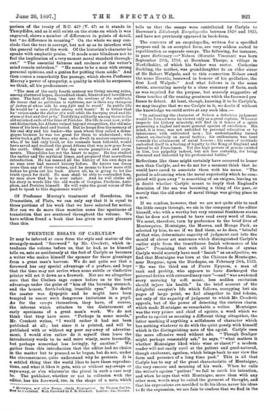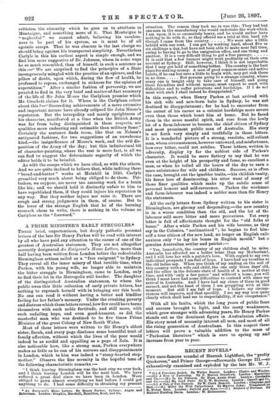PRENTICE ESSAYS OF CARLYLE.* IT may be inferred at once
from the style and matter of the strangely-named " foreword " by Mr. Crockett, which in- troduces the volume before us, that he had, as he himself tells us, sate as assiduously at the feet of Carlyle as becomes a writer who makes himself the sponsor for these gleanings from a great man's harvest. We do not quite see that a foreword has any special advantage of a preface, and hope that the time may not arrive when some subtle or vindictive printer will set it down as a firework. Nor are we altogether Bare that the Chelsea sage comes before us to the beat advantage under the guise of "him of the burning stomach, and the honest, forth-looking, irascible eyes." No doubt the master was dyspeptic and he might have been tempted to resent such dangerous imitations in a pupiL As for the essays themselves, they have, of course, the interest which attaches to the disinterment of early specimens of a great man's work. We do not think that they have more. "Perhaps in some moods," Mr. Crockett writes, "I would rather it had not been published at all ; but since it is printed, and will be published with or without my poor say-away of advertise- ment, I would e'en rather do it myself than leave the introductory words to be said more wisely, more learnedly, but perhaps somewhat less lovingly, by another." We gather from this introduction that the editor had no choice in the matter but to proceed as he began, but do not, under the circumstances, quite understand why he protests. It is
settled thing that the world likes to have these reproduc- tions, and what it likes it gets, with or without say.aways or says-away, or e'en whatsoe'er the plural in such a case may be. The publisher, whether or not in collusion with the editor, has his foreword, too, in the shape of a note, which • Montaigne, and other Faros. chiefly Bingraphicai. By Thomaa Carlyle. Mow fint c.nlected. With Foreword by J. W. Crockett. London: Jae. Goxans. tells us that the essays were contributed by Carlyle to Brewster's Edinburgh Encyclopedia between 1820 and 1823,
and have not previously appeared in book-form.
The contents of an encyclopasdia,, written for a specified purpose and in an accepted form, are very seldom suited to republication as separate essays. The following, for instance, is pure dictionary :—" Nelson (Horatio Viscount) was born September 29th, 1758, at Burnham Thorpe, a village in Norfolkshire, of which his father was rector. Catherine Suckling, the mother, was granddaughter to an elder sister of Sir Robert Walpole, and to this connection Nelson owed.
the name Horatio, bestowed in honour of his godfather, the first Lord Walpole." And what follows is in the same strain, amounting merely to a close summary of facts, such
as was required for the purpose, but scarcely suggestive of those touches of the coming greatness which the foreword pro
fesses to detect. At least, though, knowing it to be Carlyle's, we may imagine that we see Carlyle in it, we doubt if without the knowledge we could arrive at any such idea :—
"In estimating the character of Nelson a defective judgment would be formed were he viewed only as a groat captain. Whoever inspects his history minutely, will find in it traces of a spirit possessing a higher and more general species of excellence. His. mind, it is true, was not unfolded by personal education or by, intercourse with cultivated men ; his understanding turned almost exclusively on naval tactics; his enthusiasm was bent towards the attainment of naval honour ; his sense of rectitude embodied itself in a feeling of loyalty to the King of England and' hatred to all Frenchmen. Yet the high powers of genius existed; in him, lees palpably indeed, but not less certainly, for being- obscured and distorted by his professional habits."
Reflections like these might certainly have occurred to lesser, men than Carlyle, and we do not for a moment think that he. would have cared to associate theta with his name. "The period is advancing when the naval superiority which he corn-. pleted will pass away" is something of an enigma, leaving us in doubt whether Carlyle meant to imply that England's dominion of the sea was becoming a thing of the past, or merely that the old order of naval things was giving place to a new.
If we confess, however, that we are not quite able to read the little essays through, we sin in the company of the editor himself, who with a worthy but very unusual frankness states that he does not pretend to have read every word of them. We must, therefore, turn by preference to the brief lives of Montesquieu, Montaigne, the Moores, and Mungo Park, as selected by him, to see if we find them, as he does, "brimful of that wise, determinate sagacity of judgment cast into the mould of clever art sentences which distinguished Carlyle's earlier style from the tumultuous Isaiah vehemence of his later." Premising that with all his freedom of syntax Carlyle would scarcely have used "Isaiah" as an adjective, we find that Montaigne was born at the Chateau de Montaigne, near Bergerac, upon the Dordogne, on February 28th, 1533. "He was the third son of Pierre Eyquem, a man of rank and probity, who appears to have discharged the paternal duties with extraordinary care "—and "was awakened every morning by soft music, less sudden excitation should injure his health." In the brief account of the delightful essayist's life which follows, occupying but six pages of large print, we fail altogether to find tokens, not only of the sagacity of judgment to which Mr. Crockett appeals, but of the power of detecting the curious charm which made Montaigne so remarkable a writer. Montaigne was the very prince and chief of egoists, a word which we prefer to egotist as meaning a different thing altogether, the latter marking if anything a selfishness of character which has nothing whatever to do with the quiet gossip with himself which is the distinguishing note of the egoist. Carlyle uses the more offensive word without ado. "Though Scaliger might perhaps reasonably ask," he says, "what matters it whether Montaigne liked white wine or claret ? ' a modern reader will not easily cavil at the patient and good-natured, though exuberant, egotism, which brings back to our view the form and presence of a long time past." This is all that Carlyle has to say of the great characteristic of Montaigne, the very essence and meaning of his work. When he calls the writer's egoism " patient " we fail to catch his intention, and when he says that with Montaigne, more than with any other man, words may be called the garment of thought, and that his expressions are moulded to fit his ideas, never his ideas to fit the expression, we are fain to confess that we find in the criticism the obscurity which he goes on to attribute to Montaigne, and something more of it. That Montaigne is " neglectful " we cannot admit, believing his careless- ness to be part of his system, as it must be of all egoistic essays. That he was obscure is the last charge we should bring against his transparent simplicity. Nevertheless Carlyle in this his earliest aspect is simple enough, and we find him more suggestive of Dr. Johnson, whom in some ways he so much resembled, than of himself, in such a sentence as this :—" We are surprised to find the principles of a Stoic incongruously mingled with the practice of an epicure, and the pillow of doubt, upon which, during the flow of health, he professed to repose, exchanged in sickness for the opiates of superstition." After a similar fashion of perversity, we are puzzled to find in the very brief and matter-of-fact summary of the life of Sir John Moore the Carlylean promise which Mr. Crockett claims for it. Where is the Carlylean colour about this ?—" Succeeding achievements of a more extensive and important nature have already eclipsed Sir John Aloore's reputation. But the intrepidity and manly uprightness of his character, manifested at a time when the British Army was far from being distinguished in these respects, are qualities more endearing and estimable than military fame." Certainly the sentence finds room, like that on Nelson's antiquated fashions, for two suggestions of an unwelcome kind,—the insignificance of Moore's work, and the evil dis- position of the Army of the day ; but this infinitesimal bit of character-painting, where the rest is mere fact, is all we can find to suggest the determinate sagacity of which the editor holds it to be brimful.
As with the essays which we have cited, so with the others. And we are quite inclined to believe that, while inditing these " bread-and-butter " works at Mainhill in 1820, Carlyle grumbled very much about being obliged to do them. Pot- boilers, we suppose, are never too amusing work for a brain like his ; and we should hold it distinctly unfair to him to have republished them, if they could injure his reputation in any way. But they neither injure nor raise it. There are rough and strong judgments in them, of course. Bat to the lover of the strange English that he of the burning stomach chose to write, there is nothing in the volume so Carlylese as the "foreword."



















































 Previous page
Previous page